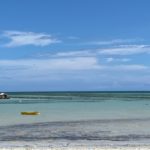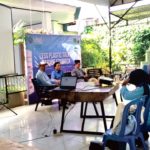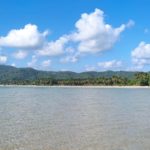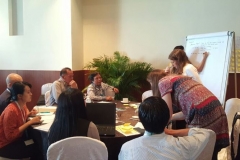
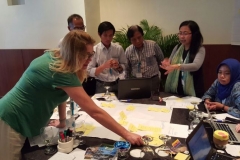
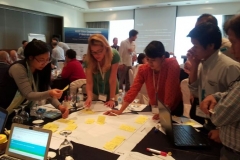
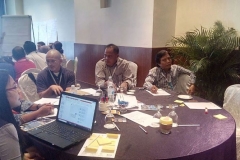
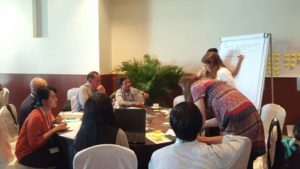
Author Archives: Admin Cserm
Blue Communties at the East Asian Seas Congress
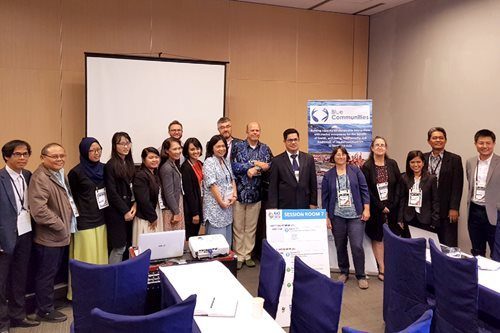
During the session there were presentations from Prof Mel Austen (Blue Communities Programme Director), Mr. Andrew Bell (North Devon UNESCO Biosphere Reserve), Dr Radisti Praptiwi (Universitas Nasional, Indonesia), Prof Lota Creencia (Western Philippines University), Prof Lora Fleming (University of Exeter) and Dr Hong Ching (University of Malaya).
Together, the presentations summarised the structure of the programme, its transdisciplinary nature and covered topics such as the beneficial impact of marine environments on human health, building research capacity in sustainable planning and management, the application of satellite data for marine management, food security and supporting Early Career Researchers (ECRs).
Session discussions focused on impact optimisation including: linking the Blue Communities programme to the UN Decade of Ocean Science initiative; linking outcomes and processes to develop innovative finance mechanisms; the benefits of multi-national collaboration in transdisciplinary research, and integrated marine planning supported by the evidence from transdisciplinary research.
This year saw the Congress celebrate “25 Years of Partnerships for Healthy Oceans, People and Economies: Moving as One with the Global Ocean Agenda” and is open to a broad range of stakeholders including: national and local governments; the United Nations system; intergovernmental organizations; bilateral and multi-lateral projects; international financial institutions; non-governmental organizations; civil society organizations; academic institutions; scientific community; private sector, and other stakeholders. For further information visit www.pemsea.org.
Source: www.blue-communities.org
First Annual Meeting GCRF BC
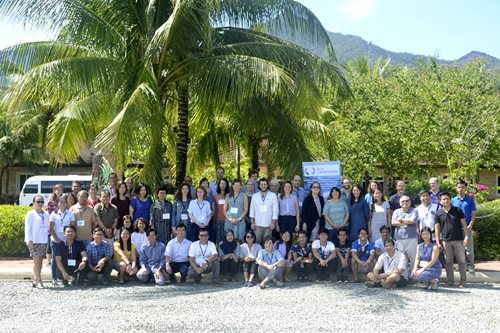
Recently the Blue Communities team met in Palawan, Philippines for its first programme-wide progress meeting. Over 60 scientists from the UK, Philippines, Malaysia, Indonesia and Vietnam enjoyed a packed agenda of project and case study site updates, interspersed with interactive sessions over the 3-day meeting.
The interactive sessions included a highly engaging stakeholder role-play activity, led by researchers from the University of Exeter, and a ‘guess the habitat from space’ game, led by researchers from Plymouth Marine Laboratory, which helped demonstrate the different resolution levels of satellite sensors. Other workshops included information gathering for ecosystem services at the case study sites, and stakeholder communication methods, both of which resulted in some intriguing and unexpected intelligence, such as using music to convey marine management messages to the local coastal communities.
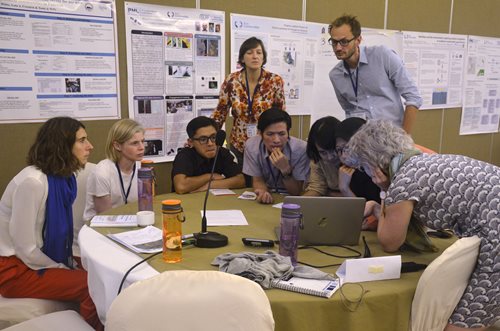 There was a highly pertinent panel discussion on research ethics including: how to conduct research ethically and responsibly; the procedure for an ethics approval application, and what to do if unethical practices are witnessed. This fascinating exploration of the issues surrounding research ethics demonstrated a real interest and desire to discuss further. Consequently, more capacity building in research ethics for all researchers participating in the projects within the Blue Communities programme is being planned. Other training needs identified included evaluation of research outcomes and impact, stakeholder engagement and ‘training the trainer’ workshops.
There was a highly pertinent panel discussion on research ethics including: how to conduct research ethically and responsibly; the procedure for an ethics approval application, and what to do if unethical practices are witnessed. This fascinating exploration of the issues surrounding research ethics demonstrated a real interest and desire to discuss further. Consequently, more capacity building in research ethics for all researchers participating in the projects within the Blue Communities programme is being planned. Other training needs identified included evaluation of research outcomes and impact, stakeholder engagement and ‘training the trainer’ workshops.
This meeting also provided the opportunity for the Blue Communities Early Career Researchers (ECR) Network to hold its first meeting. The network has been created to support ECRs across Blue Communities and offered a peer-to-peer forum to exchange knowledge on career development, challenges, collaborations, training needs, mentoring and communication ideas.
Training workshops either side of the progress meeting were also held at the Western Philippines University, covering the topics of Earth observation, ecosystem services, evidence synthesis, climate modelling and developing future scenarios that form key elements of several of the sub-projects within the Blue Communities programme. These training sessions were very well received and there are plans for wider roll-out.
As the overall progress meeting drew to a close, discussion turned to where the next meeting will be held. It is hoped that this will be in the South West of the UK, offering the opportunity for Case Study partners to visit research institutes in the UK whilst returning the favour of the wonderful hosting by the Western Philippines University and University of Malaya partners for this very well-received meeting and the successful kick-off meeting in Kuala Lumpur last January.
Source: www.blue-communities.org
GCRF Blue Communities: Project 4 (Marine Renewable Energy)
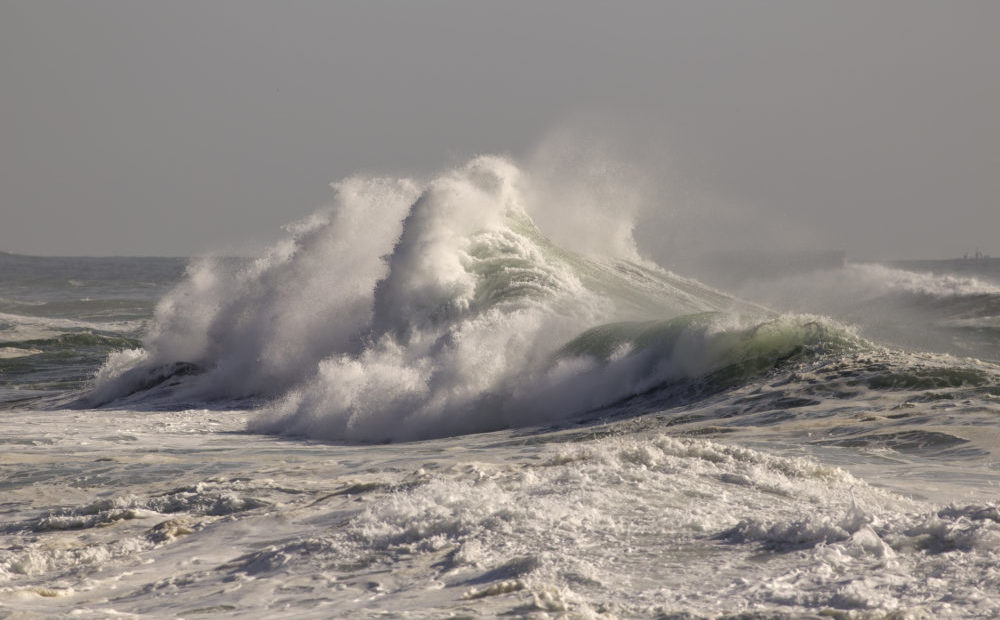
Project 4 case study site is located in Taka Bonerate Selayar Islands Biosphere Reserve, which was designated as a UNESCO’s Man and Biosphere site in 2015. The area is a mini archipelago of 130 islands in South Sulawesi Province, Indonesia with 60 village-level marine protected areas, covering 52 coastal villages, a national marine park, 11 sub-districts, 57 coastal Villages and 74 non-coastal villages.
With a total of 17,504 islands, Indonesia itself is the largest archipelago in the world. Its coasts and seas stores enormous potential, not only from a diverse range of marine ecosystem services, but also from their significant renewable energy resources. Whilst the national electricity company (PLN) has a mandate to supply all of Indonesia’s communities with a reliable and consistent source of electricity, it has significant challenges in achieving 100% coverage, particularly in remote areas. Many of these areas are inhabited by small maritime communities who live nearby marine energy potential that can be utilised to meet their local demand for electricity supply, as well as to meet their energy requirements for aquaculture, water desalination, ice production, and refrigeration, which are essential for their sustainable livelihoods.
The Project aims to investigate the possibility of, and introduce where appropriate, marine renewable energy systems as part of an integrated solution to obtaining Taka Bonerate-Selayar Islands’ local community welfare whilst protecting the natural ecosystem and mitigating the challenges of climate change. For this, baseline information on energy supply and demand, natural resources governance, and local businesses and supply chain have been gathered this year, and throughout the next 3 years Project 4 team members will continue to engage in participatory planning and action research with local community members, decision makers, government officials, local businesses, and academic partners to produce:
- Identification report on Taka Bonerate Selayar Islands Biosphere Reserve’s energy demand-supply profile
- Joint paper publication on marine renewable energy resources potential in Taka Bonerate Selayar Islands Biosphere Reserve
- Training modules on approach to renewable energy assessment in remote communities
- Training modules on marine renewable energy systems conceptual design in remote communities
- Strategic report on marine renewable energy systems for Taka Bonerate Selayar Islands Biosphere Reserve
- Strategic report on skills development needs to establish local business case and supply chain in Taka Bonerate Selayar Islands Biosphere Reserve
- Strategic report on marine spatial planning recommendations for Taka Bonerate Selayar Islands Biosphere Reserve
- Policy brief for Local Government Departments and Indonesia’s relevant Ministries
- Joint paper publications on relationships between sustainable energy and resources management in relation to the Sustainable Development Goal (SDG) targets
By Dr Leuserina Garniati, Centre for Sustainable Energy and Resources Management, Universitas Nasional
Source: www.blue-communities.org

